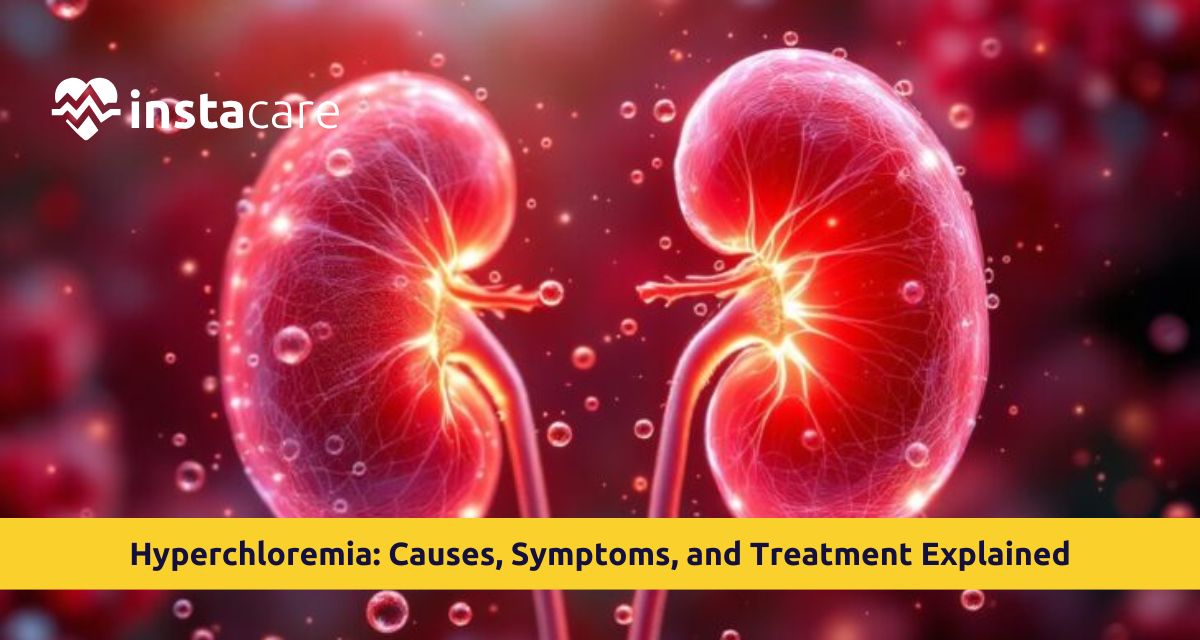What Is Hyperchloremia?
Hyperchloremia occurs when plasma chloride exceeds the normal range of 96-106 milliequivalents per liter (mEq/L). Incomorality of chloride imbalance in blood is predictive of a spectrum of underlying illness from dehydration to renal illness. Minor hyperchloremia is symptomatic but elevated values are of metabolic significance and require immediate medical assessment. Utility of hyperchloremia clinical significance in the clinical setting is its correlation with acid-base disturbance and as a sign of potentially fatal systemic illness.
Role of Chloride in the Body
Chloride is among the essential electrolytes that facilitate the numerous vital body functions. Chloride also assists, together with sodium, in the regulation and homeostasis of blood and fluid volume and the regulation of body hydration to proper levels. Chloride also assists with acid-base homeostasis to prevent the blood from being more acidic or alkaline than necessary.
Besides that, it also plays an important role in digestion through the release of hydrochloric acid in the stomach that boosts the digestion and absorption of nutrients. Hyperchloremia and sodium levels give an image of the overall state of electrolytes and heart status.
Causes of Hyperchloremia
Pathogenesis of hyperchloremia is multi-factorial and interdependent in most cases.
- Dehydration: Hyperchloremia in dehydration results from water loss and therefore a rise in the concentration of blood chloride. Profuse sweating, diarrhea, vomiting, or insufficent intake of fluid could be the cause.
- Kidney Disease: Hyperchloremia in kidney disease occurs when renal excretion of chloride function is impaired. Acute kidney damage or chronic kidney disease lowers renal function of electrolyte homeostasis.
- Metabolic Acidosis: Hyperchloremia metabolic acidosis is a solitary form of acid-base disturbance where hyperchloremia leads to acidemia. It leads to disease states like renal tubular acidosis or diabetic ketoacidosis.
- Respiratory Disorders: Hyperchloremia in respiratory acidosis secondary to chronic pulmonary disease with consequent carbon dioxide retention and consequent rise of chloride.
- Medications: Some drugs such as carbonic anhydrase inhibitors, saline overinfusion, and some diuretics produce hyperchloremia by disrupting renal regulation of chloride.
- Hormonal Imbalances: Al Aldosterone derangements such as hyperaldosteronism can affect regulation of chloride.
Symptoms of Hyperchloremia
Symptoms of hyperchloremia depend on etiology and severity. Slightly hyperchloremic patients are asymptomatic and are detected incidentally during routine lab workup. Moderately to severely symptomatic patients have:
- Increased dryness of mouth and thirst
- Weakness and fatigue
- Tachypnea and increased inspirations (acidosis compensation)
- Change in mental status or confusion
- Hypertension
- Muscle twitch or spasms
- Edema and fluid overload
The signs are antecedent of causes of hyperchloremia imbalance for chloride and clinical evaluation is important in the diagnosis of the condition appropriately.
Diagnosis of Hyperchloremia
Hyperchloremia diagnosis begins with a BMP or CMP of serum chloride. The doctors compare with other readings of the electrolytes, including sodium and bicarbonate, to make a true determination.
Other tests are:
- Arterial blood gas test to determine acid-base level
- Urine chloride tests to measure renal level
- Kidney function tests of blood urea nitrogen and creatinine
- Measurement of anion gap to differentiate etiology of metabolic acidosis
Hyperchloremia pathophysiology is a consideration of whether the excess chloride is deranging metabolism or filling in for deficit of some other product and guiding appropriate management.
Complications of Untreated Hyperchloremia
Untreated hyperchloremia has extremely serious implications for health. Chronic metabolic acidosis leads to permanent organ damage with resulting long-term renal function and osteodystrophy. The foul derangement of electrolyte will lead to cardiac arrhythmia or seizure in the unusual situations. Hyperchloremia itself aggravates the primary renal disease underlying, a vicious cycle of worsening renal function with relentless spin. The pathologic process underlying for hyperchloremia itself continues unrelented and leads to organ damage and poor quality of life.
Treatment and Management
Normalization of the electrolyte balance and restoration of the cause is the hyperchloremia treatment and management. The treatment is done through:
- Fluid Management: Intravenous fluid efficiently dilutes chloride level. Doctors select fluid cautiously not to worsen the imbalance.
- Drug Adjustment: Causative drugs discontinuation or alteration corrects the issue. Other drugs with a dissimilar effect on the electrolytes are administered.
- Treatment of Cause: Treatment of underlying cause of kidney disease, endocrine disease, or lung disease eliminates cause of elevated chloride.
- Diuretic Therapy: Loop diuretics in certain cases allow kidneys to eliminate excess chloride from body, but careful monitoring avoids resulting electrolyte imbalance.
- Hyperchloremia nursing management includes ongoing monitoring of vital signs, intake and output, confusion and other acute mental status, and ongoing monitoring of electrolytes. Recognition of early warning signs and utilization of the treatment algorithms correctly also lie in the hands of nurses.
Prevention Tips of Hyperchloremia
Prevention of hyperchloremia is achieved by maintaining proper hydration, especially with exercise or illness. Medicated patients with chronic renal illness should be screened with an eye to early detection of imbalance. Compliance with drug regimen ordered and reporting side effects to medical personnel averts danger. Consuming proper and balanced diet and use of salt daily keeps
electrolyte balances normal. Following up and investigation on regular basis in chronic disease facilitate early control before complicated issues arise.
Conclusion
Delineation of hyperchloremia vs hypochloremia and clinical delineation of the requirement for chloride imbalance allow for physicians and individuals to remain healthy. Hyperchloremia typically indicates medical conditions that require balancing, yet treatment and early diagnosis typically put everything in balance without causing harm to anyone. Early diagnosis of symptoms and treatment of the causative conditions allow one to prevent complications and remain healthy with electrolyte balance necessary for overall wellness.
Please book an appointment with the
best Nephrologist in Lahore, Karachi, Islamabad, and all major cities of Pakistan through
InstaCare, or call our helpline at 03171777509 to find a verified doctor for your disease.

